The Samsung 860 PRO (512GB And 4TB) SSD Review: Replacing A Legend
by Billy Tallis on January 23, 2018 10:00 AM ESTAnandTech Storage Bench - Light
Our Light storage test has relatively more sequential accesses and lower queue depths than The Destroyer or the Heavy test, and it's by far the shortest test overall. It's based largely on applications that aren't highly dependent on storage performance, so this is a test more of application launch times and file load times. This test can be seen as the sum of all the little delays in daily usage, but with the idle times trimmed to 25ms it takes less than half an hour to run. Details of the Light test can be found here. As with the ATSB Heavy test, this test is run with the drive both freshly erased and empty, and after filling the drive with sequential writes.
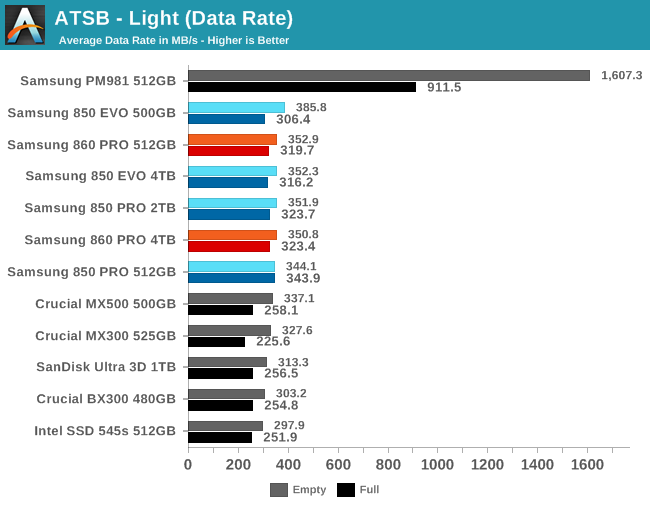
The Samsung SATA drives can mostly be distinguished from the other SATA drives by how much of their performance they retain when full; most of the competing drives show a bigger relative drop in average data rate. Between the Samsung drives, the differences are insignificant, and the peak performance of the competitors is pretty close to that of the Samsung drives.
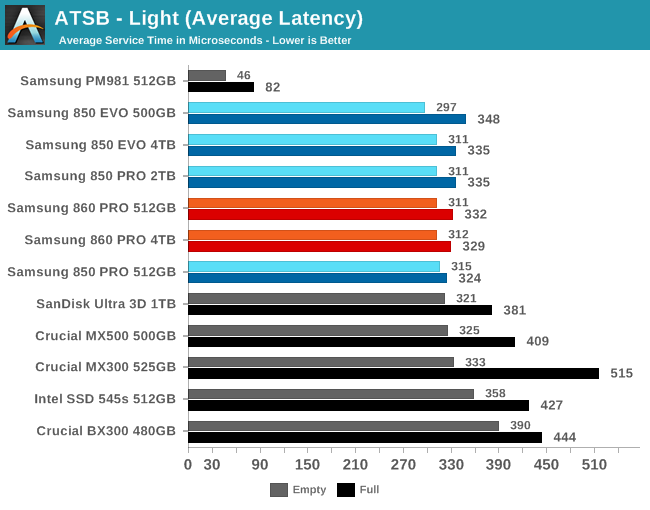
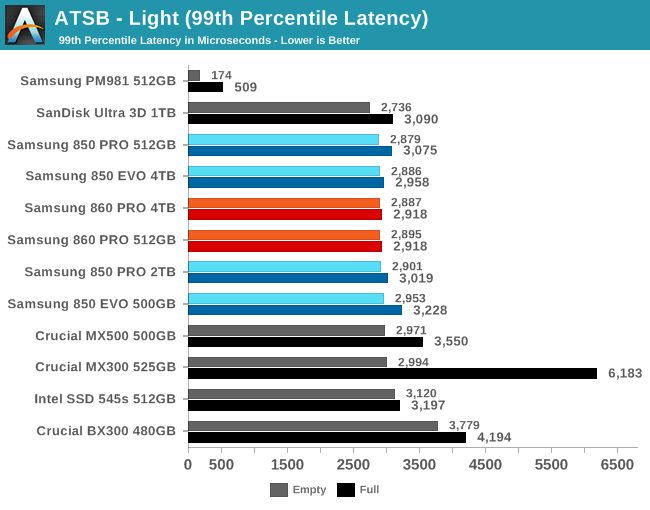
The average and 99th percentile latency scores on the Light test show that most of these SATA drives perform almost identically, but the 860 PROs have smaller full-drive performance hits than the other drives.
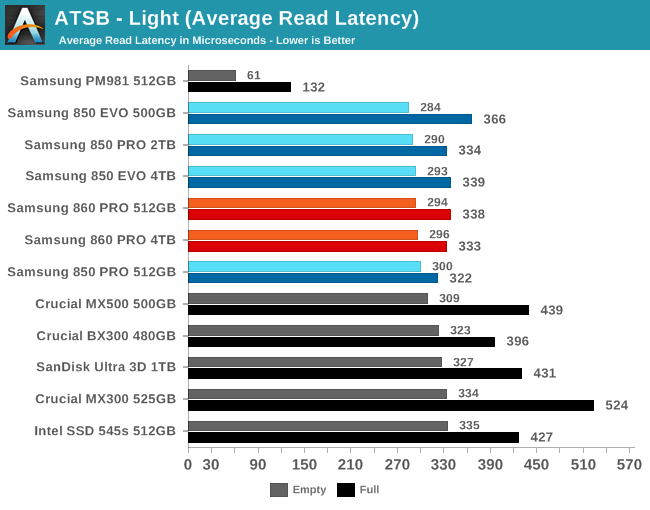
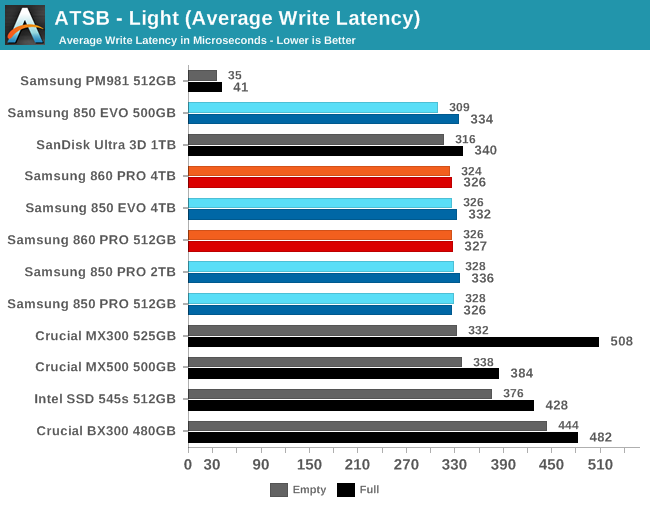
The average read latencies on the Light test tend to be a bit lower than the write latencies when the test is run on an empty drive, but when the drives are full, the read latencies climb to be slightly higher than the write latencies. The Samsung SATA SSDs all show smaller performance hits from being full than most of the competing SATA SSDs.
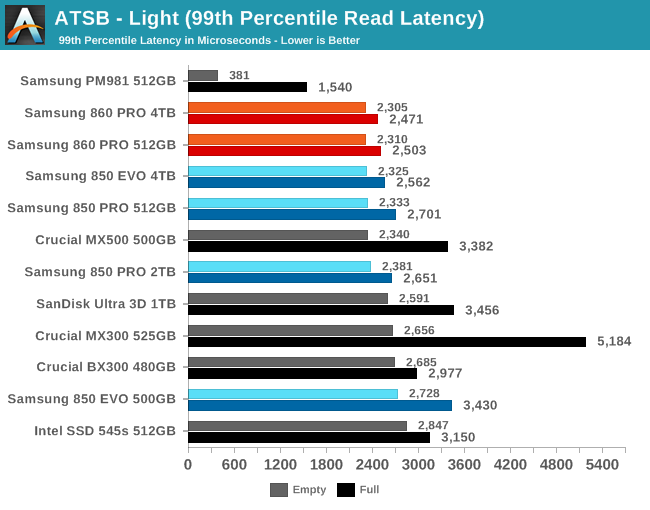
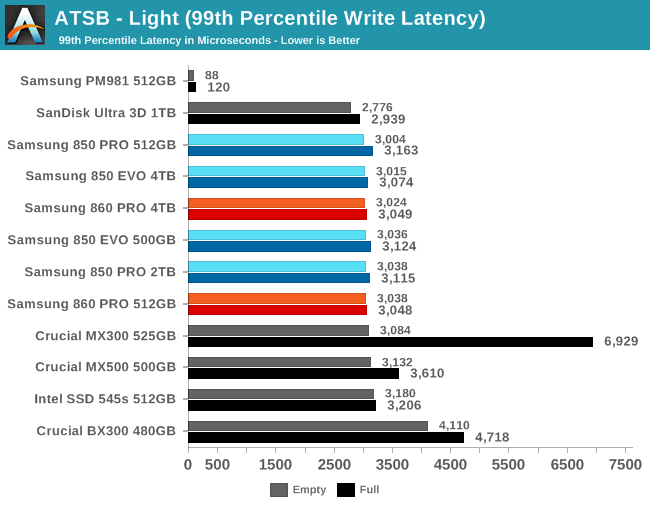
The 99th percentile read latencies are in the 2-3ms range and the 99th percentile write latencies hover right around 3ms. The Crucial drives provide the biggest outliers, but even the 5-6ms response times of the MX300 aren't bad as a worst-case performance measure.
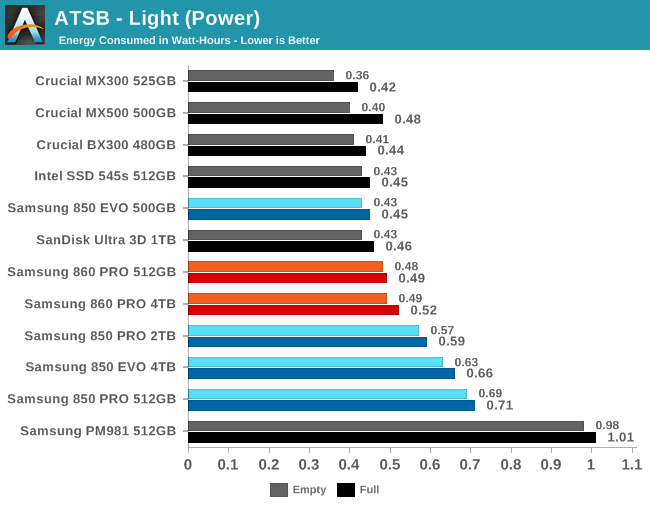
The 500 GB Samsung 850 EVO is once again the most efficient Samsung drive while the 860 PROs improve upon the poor efficiency of the 850 PROs but don't entirely catch up to the competition.










64 Comments
View All Comments
rocky12345 - Tuesday, January 23, 2018 - link
Great review as always Thank You. I am happy to see my 850 Pro 512GB drive still hanging in there and able to perform with the big guys still in the Sata based drives that is. I am thinking that when I do my whole platform upgrade in the fall of 2018 I will be picking up a Samsung 960 Pro 512GB drive for my new build and most likely keep my current drive in my current system and pass it all on to my wife I am sure she will like the great speed increase going from a 750GB HDD to the Samsung SSD & well all the other goodies in the system as well.WithoutWeakness - Tuesday, January 23, 2018 - link
If you're building an entire new system in the fall I would seriously recommend moving to a PCIe M.2 drive. The 1TB 960 EVO will blow the 1TB 860 PRO out of the water for the same price. The only trade-off is the shorter warranty (3 years vs 5 years).BurntMyBacon - Wednesday, January 24, 2018 - link
I would agree with you, except Rocky said he'll be picking up a 960Pro not an 860Pro.lilmoe - Tuesday, January 23, 2018 - link
I weep every time I see those prices... F'ing ridiculous.imaheadcase - Tuesday, January 23, 2018 - link
Only after you go over 512gig. These prices are pretty tame compared to when the old version came out without the higher end models. You would be paying $500 for that entry one for 256gig.Considering that most people really don't need more than 512gig or even 256g for the average users its pretty nice price. Media is what takes most space on drives, and most stream it or have on separate drive that is bigger.
lilmoe - Tuesday, January 23, 2018 - link
It gets on my nerves to see price actually *increase* per GB for the higher capacities instead of the opposite, which seems to be common place among drives from all vendors.I don't know. I still find it hard to justify a "premium" SSD above 512GB, when you'd want the peace of mind, oh well. Feel my pain?
BurntMyBacon - Wednesday, January 24, 2018 - link
It is especially frustrating to pay more per GB when you see models with the same controller, memory, PCB, and type of NAND chips, but one model has a few more of the NAND chips to get the capacity. Their cost to build (per GB) would come down seeing as they don't need to spend any more on any components except the extra NAND chip. In situations where a different (and low quantity) controller and/or different NAND chips are used, there is some justification, but the premium presented to customers is sometimes disparate to the costs incurred by the manufacturer.Lolimaster - Tuesday, January 23, 2018 - link
Since when a simple MLC 4TB is not a mainstream product? That should be the aim for sata SSD's.Now they try to seel you MLC like it was SLC. For less than $1k we get the 2xCrucial MX500 2TB, yeah TLC, but why MLC needs to be that costly...
BurntMyBacon - Wednesday, January 24, 2018 - link
Now that all the other manufacturers have stepped away from MLC, there is both no direct competition and an artificial shortage (or the appearance there of) for people who want MLC. I imagine the MRSP will not stick around for very long if they want to sell these. Unfortunately, I also imagine that they will settle in to the (still high) price bracket that their 850 series counterparts are at now.comma - Tuesday, January 23, 2018 - link
Could you clarify what capacities are correlated with what size PCB?Are the 256gb and 512gb pcbs the smaller pcb? The anandtech 850 evo review has a section on "inside the drives" where it compares the pcb sizes to the capacity. If you could add something like that for this review, that would be awesome. Many thanks!